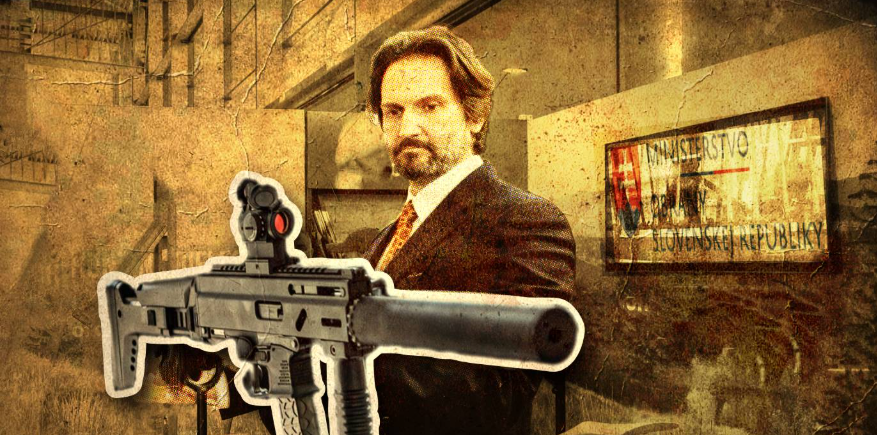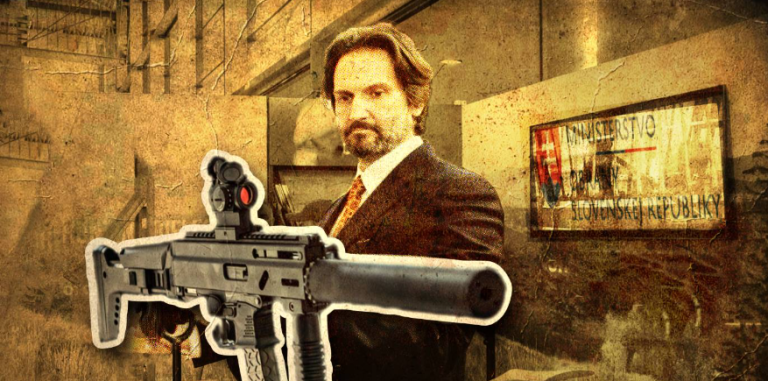Illustration: ICJK (FB/Liwa Arms, Grand Power) 2025-11-13
Illustration: ICJK (FB/Liwa Arms, Grand Power) 2025-11-13
Slovakia’s army needs new weapons, but the choice of supplier raises doubts. Minister of Defense Robert Kaliňák says he wants to buy them from a Slovak manufacturer. However, weapons from Grand Power, owned by Jaroslav Kuracina, a former ally of a Slovak far-right extremist party, do not have the best reputation among shooters. In addition, the Investigative Centre of Ján Kuciak (ICJK) has revealed that Kaliňák’s company is based at the premises owned by the people connected to Grand Power.
When President Peter Pellegrini, Defense Minister Robert Kaliňák, and MMA fighter Attila Végh participated in training for the new National Defense Forces in June of this year, they learned to shoot with a Model 58 rifle, the same weapon that Czechoslovak conscripts have been training with since, as the name suggests, 1958.
Since the nearly 70-year-old guns no longer meet modern requirements, the Ministry of Defense plans to purchase more than 20,000 new assault rifles for approximately €100 million.
Although the modernization of weapons is necessary, Minister Robert Kaliňák has set conditions that can only be met by one company—Grand Power from Slovenská Ľupča, owned by former soldier Jaroslav Kuracina—unless a foreign manufacturer plans to build a factory in Slovakia. In the past, Kaliňák himself considered Kuracina unreliable due to his extremist views and sympathies for far-right party of Marián Kotleba, which Kuracina has since renounced.
But today, Kaliňák does not criticize Kuracina anymore. ICJK has revealed that the reason for this may be hidden ties between the minister and the Central Slovakian arms manufacturer: Kaliňák’s own arms company, LIWA Arms Slovakia, is based at a property belonging to the Goga family, which has ties to Kuracina’s Grand Power arms factory.
Marián Goga Jr. is the managing director of the companies that serve as the exclusive distributors of Grand Power weapons in the US. The owner of the international network Global Ordnance, in which Goga is also involved, is the controversial American arms dealer Marc Morales.
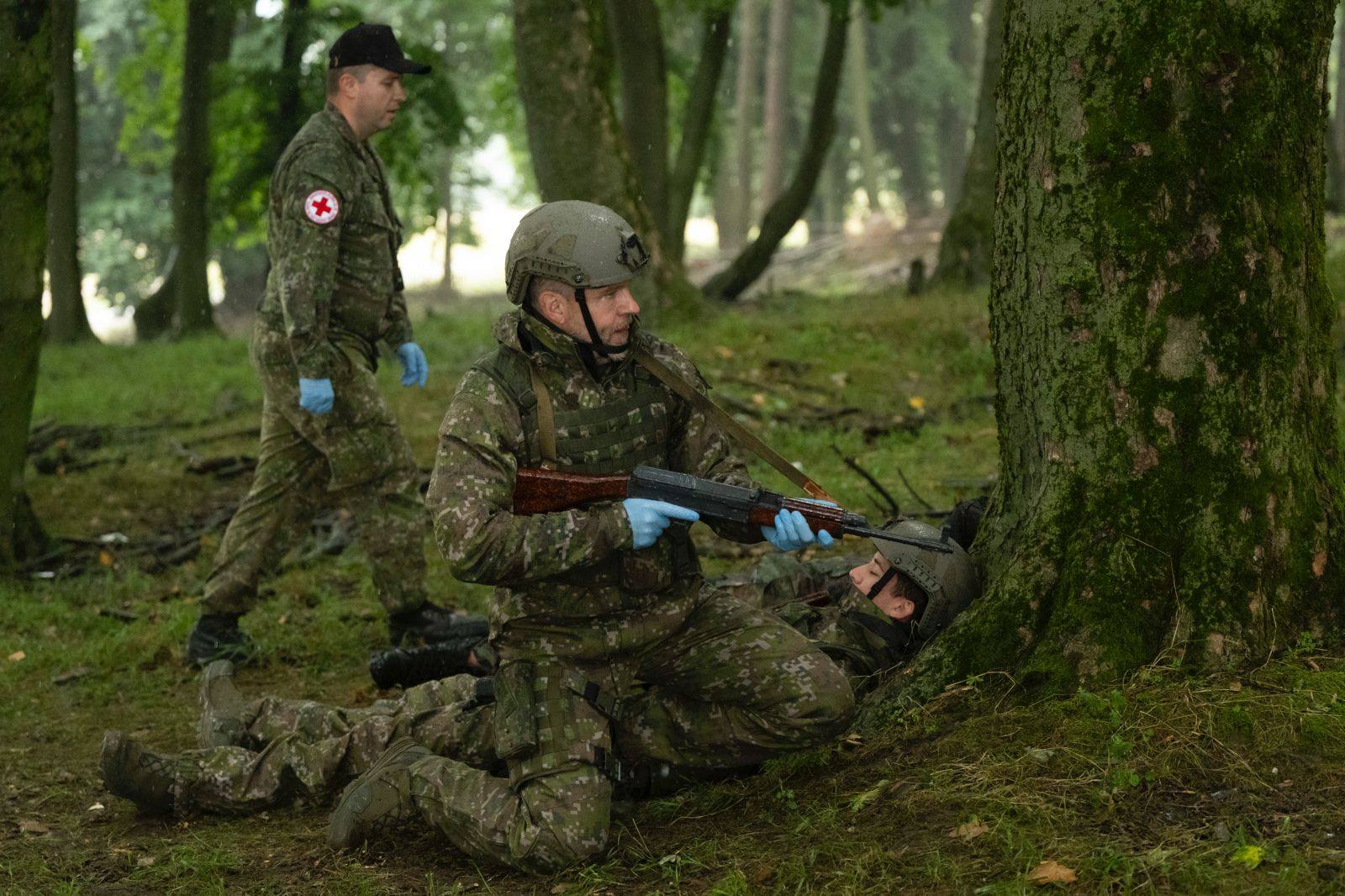
President Peter Pellegrini holding a Vz.58 rifle during the National Defense Forces training. Source: Facebook_Ministerstvo obrany Slovenskej republiky
He was caught committing corruption—and then supplied weapons on behalf of the Pentagon.
In 2010, Marc Morales was among 22 arms dealers accused of attempting to bribe the Gabonese defense minister to obtain a $15 million contract. In reality, it was a trap set by the FBI. Morales explained to agents “creative” ways of paying bribes, including donating a $100,000 armored vehicle to an Egyptian intermediary. After paying part of the bribe, he was charged, but prosecutors withdrew all charges under unusual circumstances. Morales then founded Global Ordnance, which won $72 million in Pentagon contracts to supply weapons to Syrian rebels. Today, he also supplies weapons to Ukraine, and his company is the exclusive distributor of Slovakia’s Grand Power in the US.
According to information from the daily SME, the ministry is currently only communicating with Grand Power, ignoring all other manufacturers. The Ministry of Defense did not respond to questions from ICJK about whether it is also testing weapons from other manufacturers or only those from Kuracina’s arms factory.
However, the purchase is imminent. Kaliňák told Denník N that the decision should be made soon and admitted that the purchase could take place through a tender, a shortened tender, or even a direct award.
Neither the Minister of Defense nor his department responded to questions from ICJK. Before this report was published, the minister responded in a video posted on Facebook. In it, he claims that he set the condition that the weapons must be manufactured in Slovakia in order to support Slovakia’s GDP and for strategic reasons. “That is why the Czech Republic bought Czech weapons, Germany bought German weapons, and Britain bought British weapons. That is the basis, and if you do not understand the interests of the Slovak Republic, it is completely pointless to lecture you on certain matters,” Kaliňák claims.
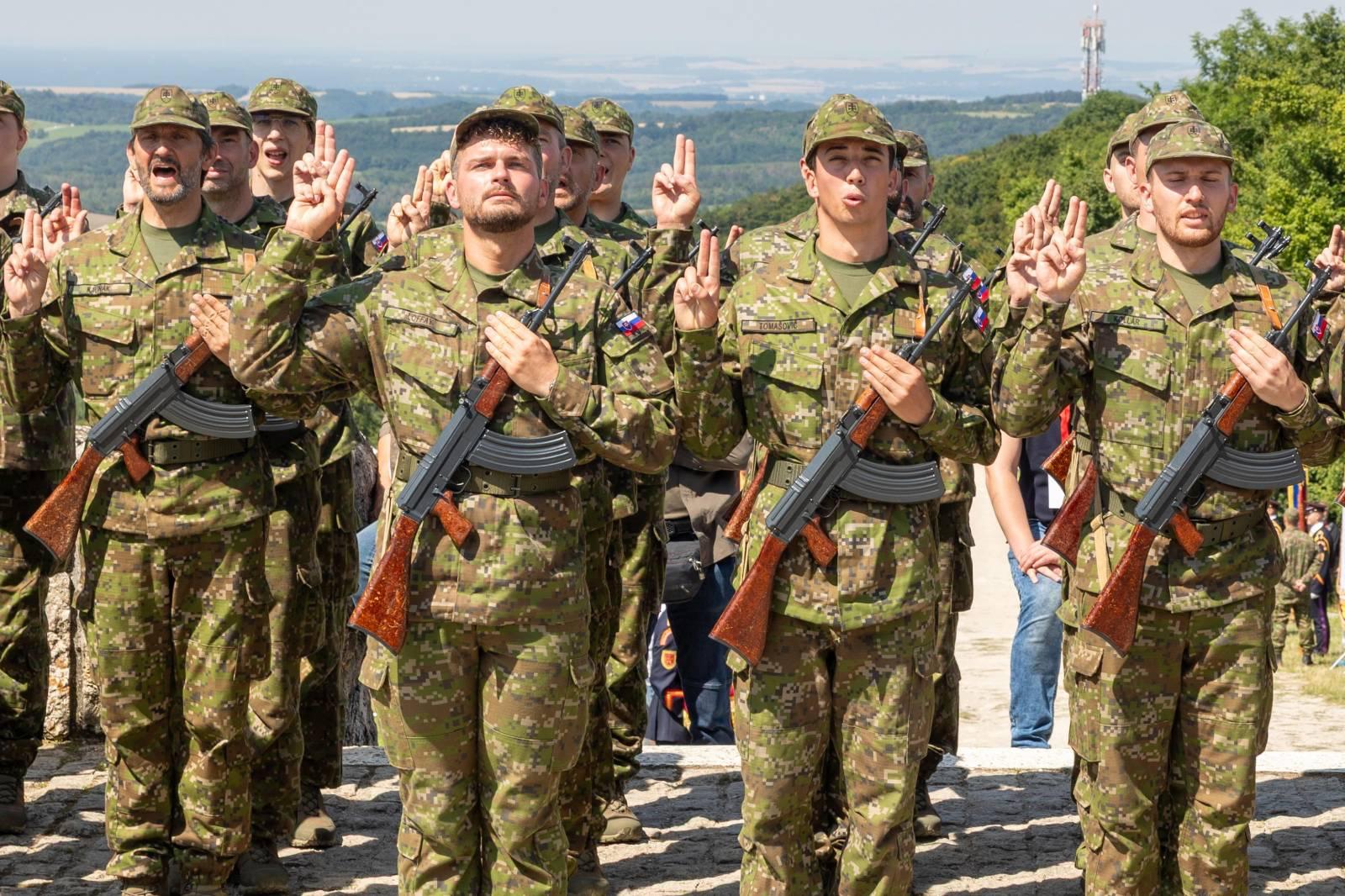
Minister of Defense Kaliňák (left) while taking the oath ater finishing the National Defense Forces training. Source: Facebook_Ministerstvo obrany Slovenskej republiky.
Viliam Ostatník, an analyst at the Adapt Institute think tank, says that such purchases are made abroad through transparent competition: “Tenders are also held abroad, whether in Germany, the Czech Republic, France, or the US. If a domestic manufacturer ultimately wins these tenders, that is of course perfectly fine, but it was after demonstrating certain advantages in the competition, offering better solutions, and submitting a better bid,” Ostatník says.
The arms company Grand Power did not respond to ICJK’s questions by the deadline, as its owner, Jaroslav Kuracina, is apparently currently traveling and was unable to respond despite the deadline being extended by two days. Instead, they suggested a personal visit to their facility in Slovenská Ľupča, but they could not guarantee the presence of Jaroslav Kuracina and therefore could not answer our questions not only about the quality of their weapons, but also about their relationship with the Goga family and Marc Morales. His international company, Global Ordnance LLC, also did not respond to our questions. If any of these companies send us their responses later, we will add them to the article.
Tailor-Made Conditions
The need to purchase new assault rifles for the Slovak army was also confirmed by a feasibility study prepared by the Slovak Ministry of Defense in 2023.
It concluded that the ministry should purchase new assault rifles that are up to date and aligned with modern weapon platforms. Among the possible contenders were the Colt M4A1, HK 416, and GP M4, all of which are based on the AR-15 platform, currently the most widely used weapon platform in the world.
Other weapon platforms would also meet the requirements of the Slovak Armed Forces, but under Robert Kaliňák, the ministry made a key decision: in preliminary market consultations, it stipulated that the new rifles must be based on the AR-15 platform. This condition automatically ruled out the Czech BRENs used by the Czech and Hungarian armies, as well as many other companies and weapons.
What is the AR-15?
The AR-15 is a type of assault rifle developed in the 1950s by the American company ArmaLite, which uses 5.56×45mm NATO ammunition. This is still the standard caliber throughout NATO. In 1959, ArmaLite sold the rights to the AR-15 to Colt, which developed the M16 rifle for the US Army in Vietnam. Various versions of the AR-15 (M16, M4, etc.) are still the main infantry weapons of the US armed forces. Since 2022, the US Army (but not yet other branches of the armed forces) has been rearming with the M7 rifle from the Swiss-German-American company Sig Sauer. A characteristic feature of the AR-15 platform is its modularity – the weapons can be easily adapted to different purposes by replacing components such as laser sights, lights, rifle scopes, collimators, etc. In 1988, Colt’s patents on the AR-15 expired, which means that weapons based on this platform can be manufactured by virtually any company. Today, approximately 500 companies manufacture various versions or accessories for them, and an estimated 20 million of these weapons are in civilian ownership in the US. The civilian versions are exclusively semi-automatic – self-loading, firing one round per trigger pull – while the military versions are fully automatic – i.e., firing in bursts. Grand Power is one of many companies that manufacture rifles based on this platform; their versions are called the R-15 and M4M and have so far been supplied almost exclusively to the civilian market.
However, according to experts, the widespread use of the AR-15 platform also has its advantages. “It is a very versatile weapon, which is its strength,” says Viliam Ostatník, an analyst at the Adapt Institute think tank.
“It is also characterized by accuracy, and since it is an extremely widespread and widely used platform, replacement components are easily available,” adds Ostatník. Like any weapon platform, the AR-15 has its disadvantages, according to him—for example, it is more sensitive to dirt than competing solutions.
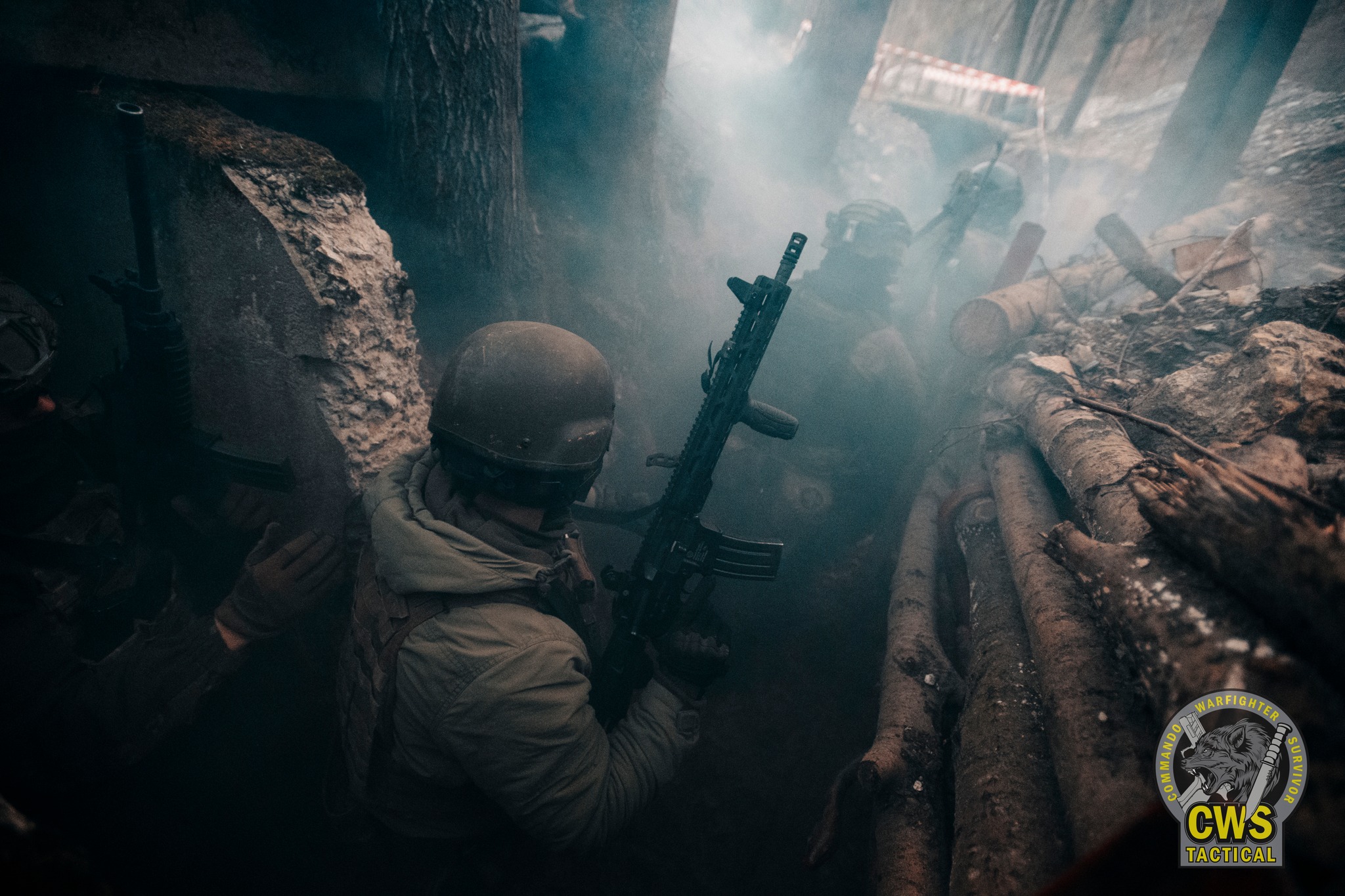
Grand Power M4M rifle. Source: Facebook_Grand Power
In addition to Grand Power, renowned arms manufacturers such as Heckler&Koch, Česká zbrojovka (in English, Czech armory), FN Herstal, Colt, Beretta, W.A.R., and Israel Weapon Industries also applied for the consultations announced in April 2024. However, after the initial meeting, the ministry stopped communicating with them.
Connection Through Real Estate in Bojnice
Grand Power owner Jaroslav Kuracina has already admitted to the daily SME that he collaborated with Kaliňák’s company in the past on the production of Liwa Arms Slovakia sporting and hunting weapons. He supplied rifle barrels, and the collaboration has since ended.
Our investigation reveals another connection between Minister Kaliňák and the Grand Power arms factory: LIWA Arms Slovakia has been based on Nemocničná Street in Bojnice since May 2025. According to the land registry, the building is owned by MPS Solutions. Its partners are Jana Gogová and Marián Goga Jr, whose father, Marián Goga Sr., was a partner in this company until 2021.

Kaliňák’s Liwa Arms is renting premises in Bojnice from the company MPS Solutions from the Goga family portfolio. Source: ICJK
Marián Goga Jr. is also the managing director of two Slovak companies: Global Ordnance Europe and Global Ordnance International. These companies are part of the American Global Ordnance, which is the exclusive distributor of Kuracina’s Grand Power in the United States.
Kaliňák’s arms company is therefore based in a building owned by people directly connected to the international distribution network of Grand Power rifle manufacturer, which has the opportunity to supply tens of thousands of weapons to the Slovak armed forces.
Marián Goga Jr. confirmed that he leases office and production space to Kaliňák’s arms company: “The rent is at a price that corresponds to the regional standard for office and production space. However, the specific rate is a trade secret,” Goga said in response to our questions.
Although he does not deny his involvement in Global Ordnance, he claims to have no connection with Jaroslav Kuracina’s arms factory: “To my knowledge, Global Ordnance LLC distributes Grand Power products in the US only for use in the commercial, i.e., civilian market, and not for the armed forces. This business relationship was established before I joined the company, or rather before I started working with Global Ordnance LLC. To my knowledge, they have been working together since 2019,” Goga Jr. said in response to our questions.
He added that at Global Ordnance, he focused exclusively on large-caliber ammunition and large-caliber weapons, which Grand Power does not have in its portfolio. “So I had no contact with Grand Power during my time at Global Ordnance LLC. I know Mr. Kuracina, as I do most representatives of the Slovak defense industry.”
Goga Jr. claims that he sold his stake in Global Ordnance in 2024 and will only remain as managing director until a replacement is found. “According to my information, however, the plan is to shut down the company in Slovakia, which is consistent with the fact that the company’s projected revenue for 2025 is zero euros,” Goga Jr. added in his reply to ICJK.
Defense Minister Robert Kaliňák did not comment on these connections. Instead of answering our questions, he posted a video on Facebook in which he said: “We have received questions from the Investigative Center of Ján Kuciak. I must admit that I have not read such unprofessional nonsense in a long time as in this case. I was very amused when they tried to connect some people I am supposed to know, who know others who know some arms manufacturers or arms dealers in America, and who are trying to lobby for us to buy Slovak weapons from Grand Power, owned by Mr. Kuracina,” said Minister Kaliňák.
Neither Kaliňák nor his department responded to our repeated requests sent by email for him to comment on his company’s relationship with Marián Goga’s company and his connection to Grand Power. In the video, he only says that he knows Grand Power owner Kuracina.
“Dear Mr. Madleňák from the Investigative Center, I really don’t need intermediaries, I know Mr. Kuracina. We even meet regularly at international exhibitions where the Ministry of Defense organizes a Slovak stand, giving individual Slovak companies the opportunity to sell their products around the world,” Robert Kaliňák said in the video.
The Goga family’s companies are thriving, while Goga Sr. is accused of bribery.
Since the beginning of the war in Ukraine, the Goga family’s companies have experienced extraordinary growth. Global Ordnance Europe, owned by American arms dealer Marc Morales and managed by Marián Goga Jr., has become one of the top 10 Slovak arms manufacturers. Its sales have grown from zero euros in 2022 to nearly 55 million in 2024. A similar jump was recorded by 4MP International (formerly ZVS Defence Industrial – ZVS Holding belongs to MSM and is engaged in the development, production, and sale of artillery ammunition), which Marián Goga Jr. co-owns with Michal Žiak, former manager of the Strnad family’s MSM Group. Its sales grew from €80,000 in 2023 to over €55 million in 2024. The third company owned by the Goga family, MPS Solutions, which leases premises to Kaliňák’s Liwa Arms, also made it into the top 20 arms companies. Its sales gradually grew from €18,000 in 2021 to over €43 million in 2024.
Marián Goga Sr. was charged in 2020 in the “Reserve 2” corruption case. The police charged the co-owner of MSM Group along with Kajetán Kičura in connection with the alleged manipulation of a public tender for four release tanks, which Kičura was supposed to influence in favor of MSM in the State Material Reserves and for which he received a bribe of almost €150,000 in a hidden form. The charges against Goga were initially dropped in 2020 by then-Special Prosecutor Dušan Kováčik, but Attorney General Maroš Žilinka reinstated them in 2021.
Doubts about quality
Robert Kaliňák says that the “Made in Slovakia” precondition is intended to help Slovak industry and that it is strategically advantageous to purchase weapons from a Slovak company.
“Strategically, it is very important that individual weapons are available, their repair, their spare parts, their service, and, if necessary, the production of new ones, in the event of a conflict, should be on our territory,” says the Minister of Defense in the video.
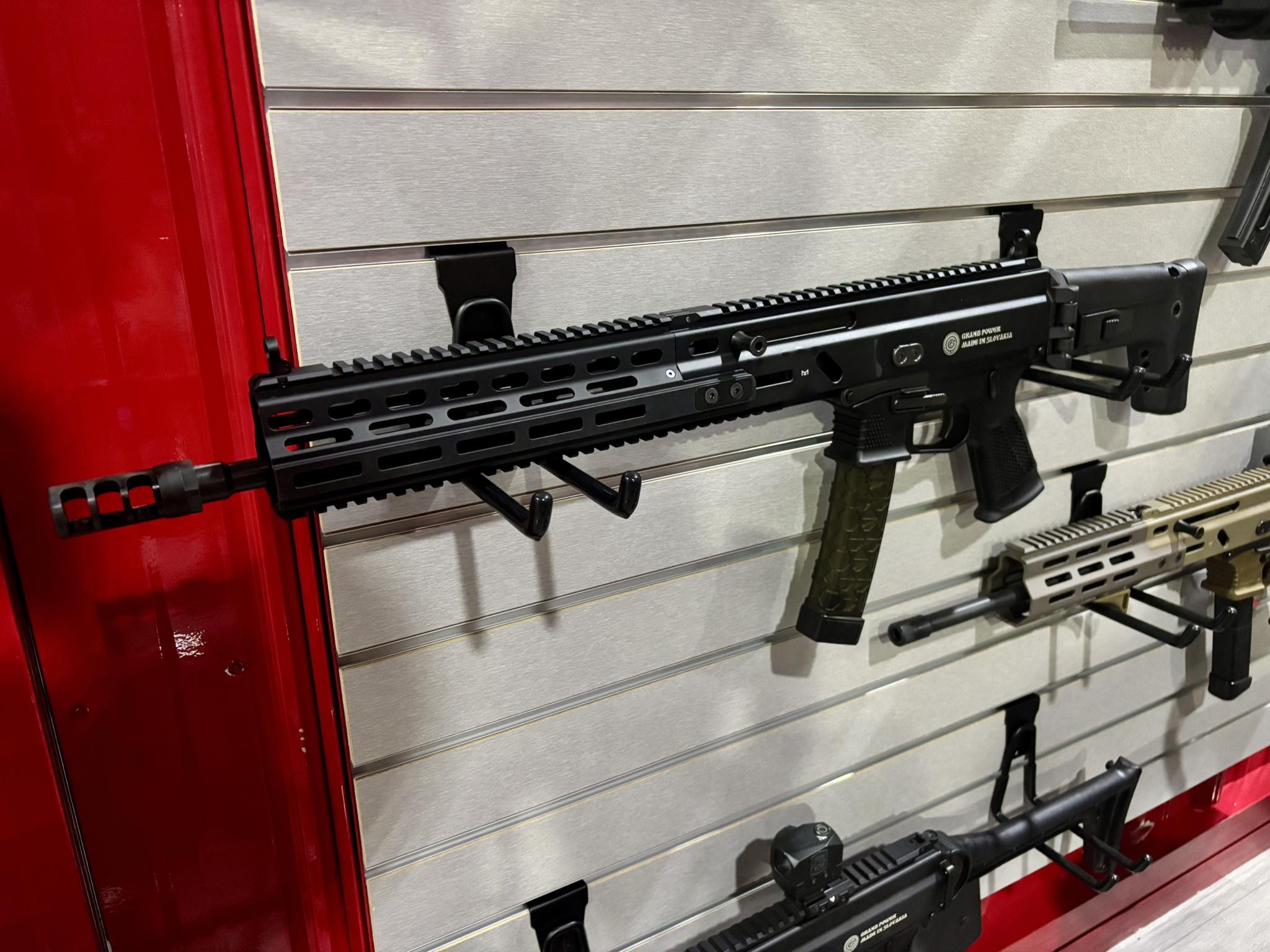
GP guns on the 2025 NRAAM Atlanta expo. Source: Facebook_Grand Power
Analyst Viliam Ostatník from the Adapt Institute confirms to ICJK that support for the domestic defense industry is an important criterion to consider. “However, it is not true that this automatically means choosing a company that is, say, 100% Slovak-owned, has its headquarters here, and so on,” adds Ostatník. He points to several cases involving Slovak companies and foreign manufacturers, such as the CV90 or Patria infantry fighting vehicles.
“I am not aware of any product in this category that has been developed and manufactured from A to Z in Slovakia, i.e., that all supply and value chains are concentrated here and there is complete self-sufficiency, everything ‘under one roof’, since we are talking about extreme crisis scenarios and the best possible preparedness,” Ostatník says of Minister Kaliňák’s video.
Another factor working against Grand Power is that it has no experience with large deliveries to armies, but also that weapons of this brand have a controversial reputation not only on shooting forums but also among experts. While some US gun YouTubers praised Stribog submachine guns, for example, other customers complain about the unreliability of this brand’s weapons.
Former police officer and weapons expert Daniel Meres, who now also works as a weapons dealer for the civilian market, points out several problems with Grand Power weapons: “Problems with reliability and workmanship are well known,” says Meres, adding that three factors are likely to be responsible: instability of manufacturing materials, inconsistency in manufacturing processes, and inadequate output quality control.
This has been evident in his experience when, for example, two identical Stribog submachine guns from Grand Power had incompatible parts.
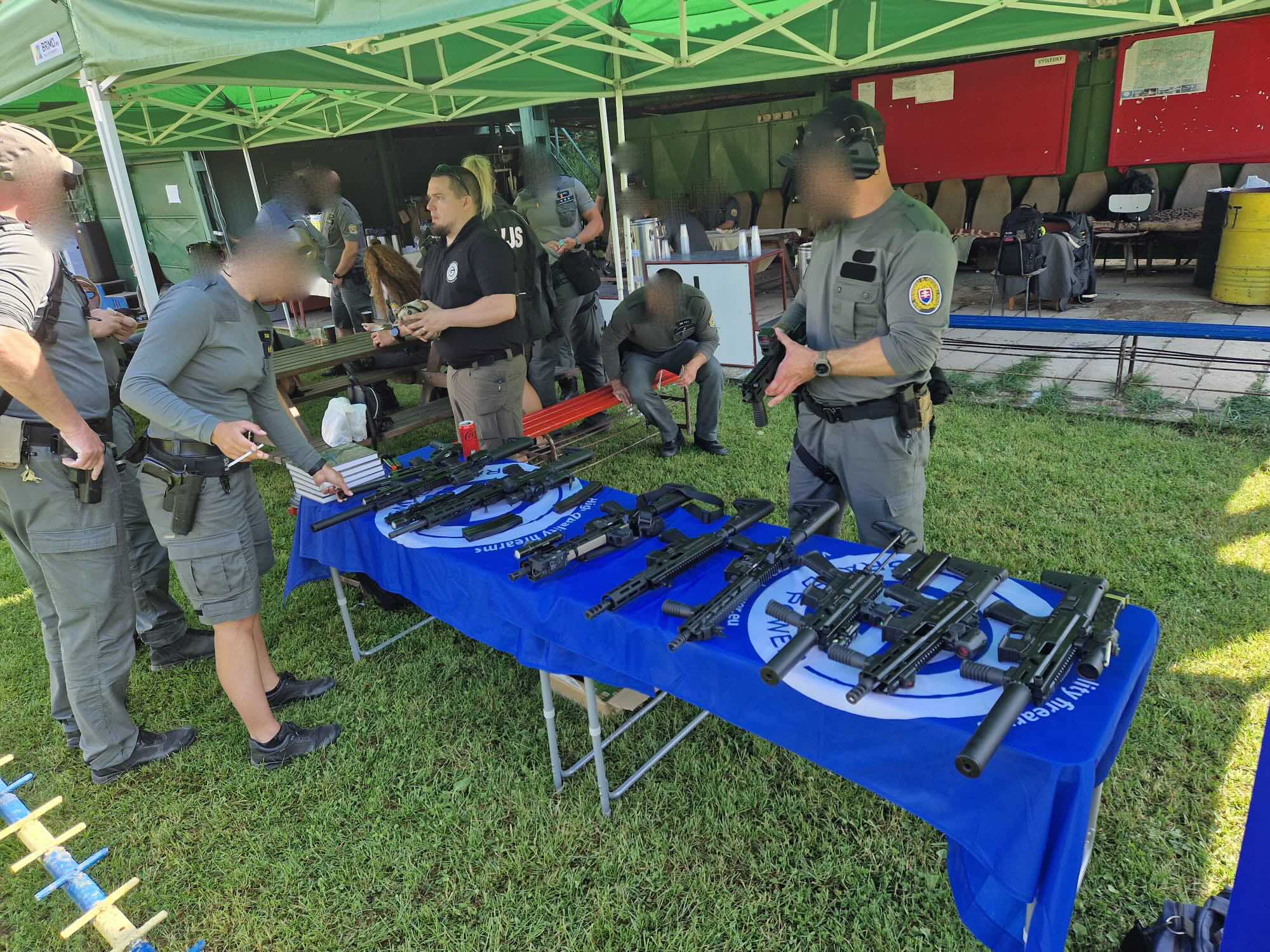
Slovak Corps of Prison and Court Guard Championship in Service Weapon Shooting 2024. Source: Facebook_Grand Power
“I cannot say objectively what the quality of Grand Power’s AR-15 is. It is possible that they manufacture weapons consistently and with high quality, but I am naturally skeptical given the history of defects in other weapon platforms from this manufacturer,” Meres points out. According to a 2023 feasibility study, the new rifles are expected to be used by soldiers for at least 20 years.
Meres also acknowledges that “it would be an advantage to have weapons from a domestic arms manufacturer in our arsenal,” but only if their quality could be objectively and transparently proven.
“For an objective assessment of quality, it would be necessary to conduct thorough functional testing of the weapons, but not those sent by the arms manufacturer for testing, but randomly selected ones. It would also be necessary to measure whether the manufacturing tolerances have been met and whether the weapon components are “MIL-SPEC” [Military Specification – technical standards set by the US Department of Defense, ed.]. If they are, it is possible to use replacement parts from AR-15 rifles from most other manufacturers, and this is also a certain prerequisite for quality and reliability,” Meres describes how he would imagine the testing.
At the end of June 2024, the ministry borrowed M4M assault rifles, pistols, and shotguns from Grand Power, which it allegedly used to train new National Defense Forces. In addition, the ministry purchased handguns and accessories from Kuracina for €49,216 excluding VAT. The ministry did not purchase or borrow weapons from other companies.
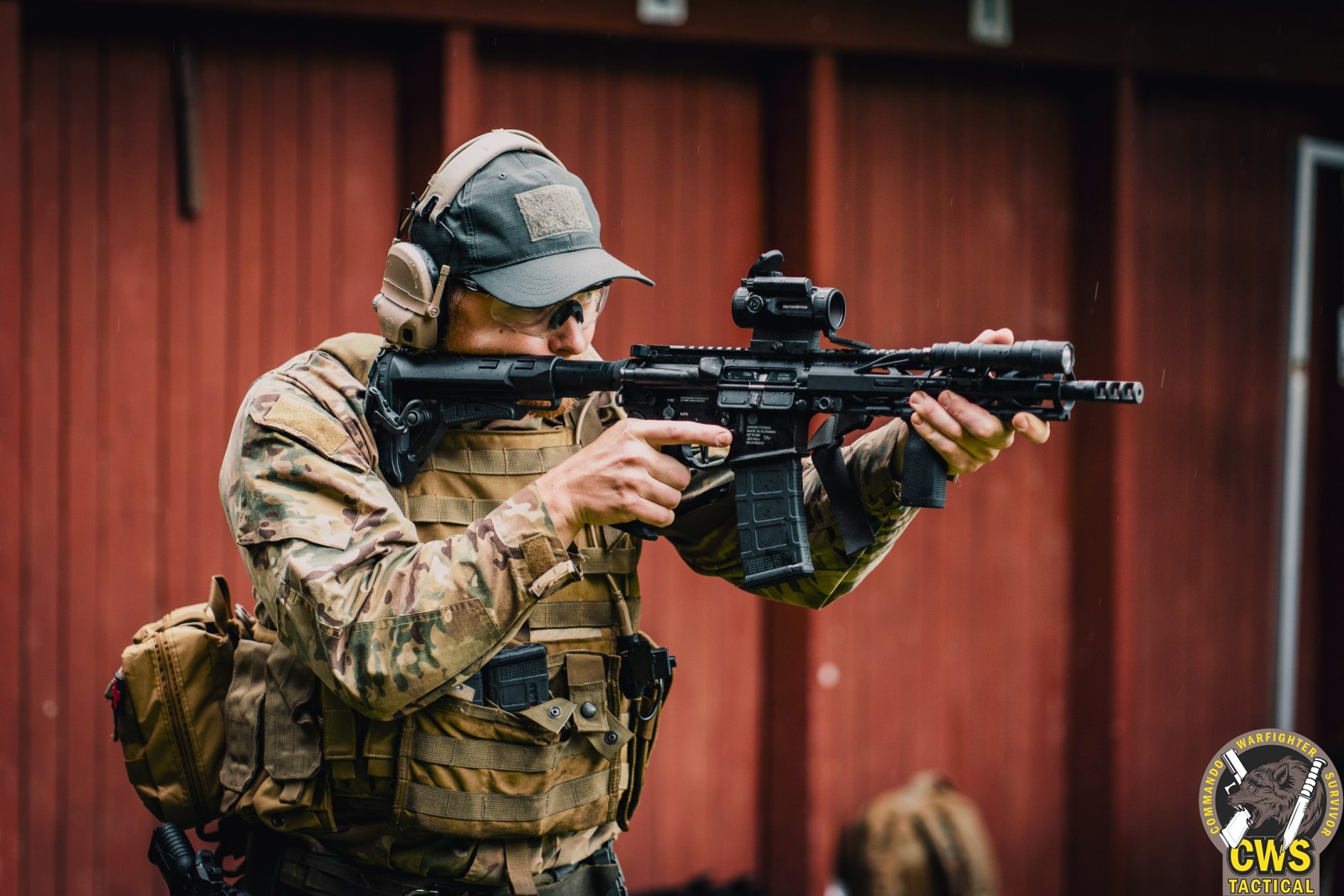
Grand Power R15 rifle. Source: Facebook_Grand Power
Grand Power did not respond to ICJK’s questions about which specific models the company provided for testing and whether they were randomly selected from production or specially prepared for testing.
It also did not respond to our questions by the deadline about how it ensures consistent quality with such a large volume; how it responds to criticism that its weapons have long-term quality fluctuations and are not considered reliable; and how it ensures that the weapons it may supply to the Slovak Armed Forces will reliably last 20 years in service.
The Extremists’ Court Armorer
Jaroslav Kuracina is also controversial because of his past. Robert Kaliňák, then as Minister of Interior, once labeled him unreliable when discussing the purchase of new pistols for the police. This former soldier is not only known for sketching and designing his first pistol himself, which he still manufactures today under the name K100. He also came to public attention through his open support for Kotleba’s radical right-wing party, the ĽSNS, which he also supported financially and under whose banner he even ran for office in the 2017 regional elections.
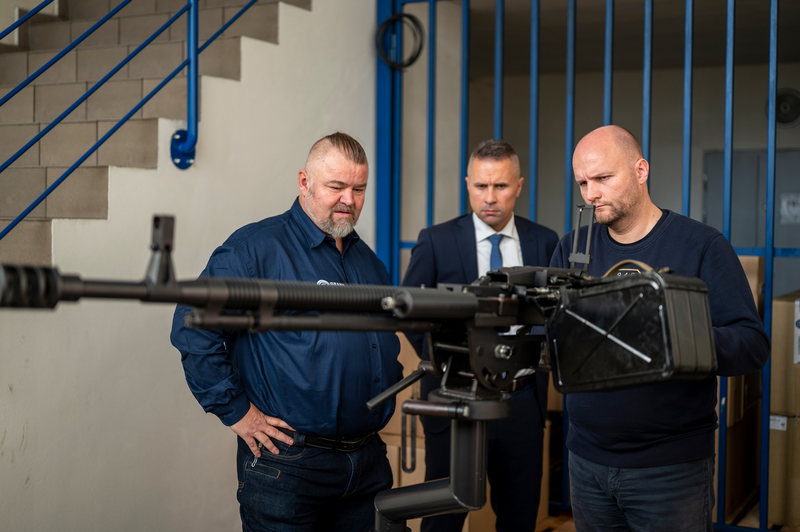
Jaroslav Kuracina (left) in 2022 during the visit of the then-Minister of defense Jaroslav Naď. Source: Grand Power
He was linked to Kotleba’s party by a “scandal” involving the school his son attended. A carnival was planned at the school, and, according to the principal, some children asked if they could dress up as the opposite sex. Businessman Kuracina interpreted this to mean that children at school would be forced to dress as the opposite sex in order to turn them into transsexuals.
“Guys, don’t let them traumatize your sons. Don’t let them convince your sons that acting like a faggot is normal!!!” Kuracina was quoted as saying by Hlavné správy, which was the first to spread the misinformation.
When Kuracina personally contacted Marian Kotleba, the Kotleba party’s website joined Hlavné správy: “Non-governmental organizations, paid for from abroad, are once again trying to undermine the morals of our society and traditional Christian values. Most recently through the “LGBTI Month under Urpín” campaign, which focuses on promoting various sexual deviations,” claimed the right-wing extremist party.
The whole situation escalated to the point where Kuracina, along with two members of Kotleba’s party, “visited” the director and recorded her. Subsequently, the director had to face threatening messages, including death threats.
Kuracina then became the “court armorer” of Kotleba’s party. Marian Kotleba owned two pistols and a civilian version of the Stribog submachine gun from Grand Power. Party MP Peter Krupa also owned a Grand Power pistol, which he brought with him to parliament in 2016.
Kuracina later parted ways with Kotleba’s party, although the exact circumstances are unknown. “Mr. Kotleba has other interests, and I will not comment further on this,” Kuracina told Denník N in 2020.
In the meantime, however, Kuracina has become one of the stars of conspiracy and disinformation media. This affinity persisted even after his split with Kotleba’s party. When Defense Minister Jaroslav Naď planned to purchase submachine guns in 2020, Kuracina criticized him, claiming that his Stribog submachine guns would be just as good and cheaper, but that the ministry was discriminating against him.
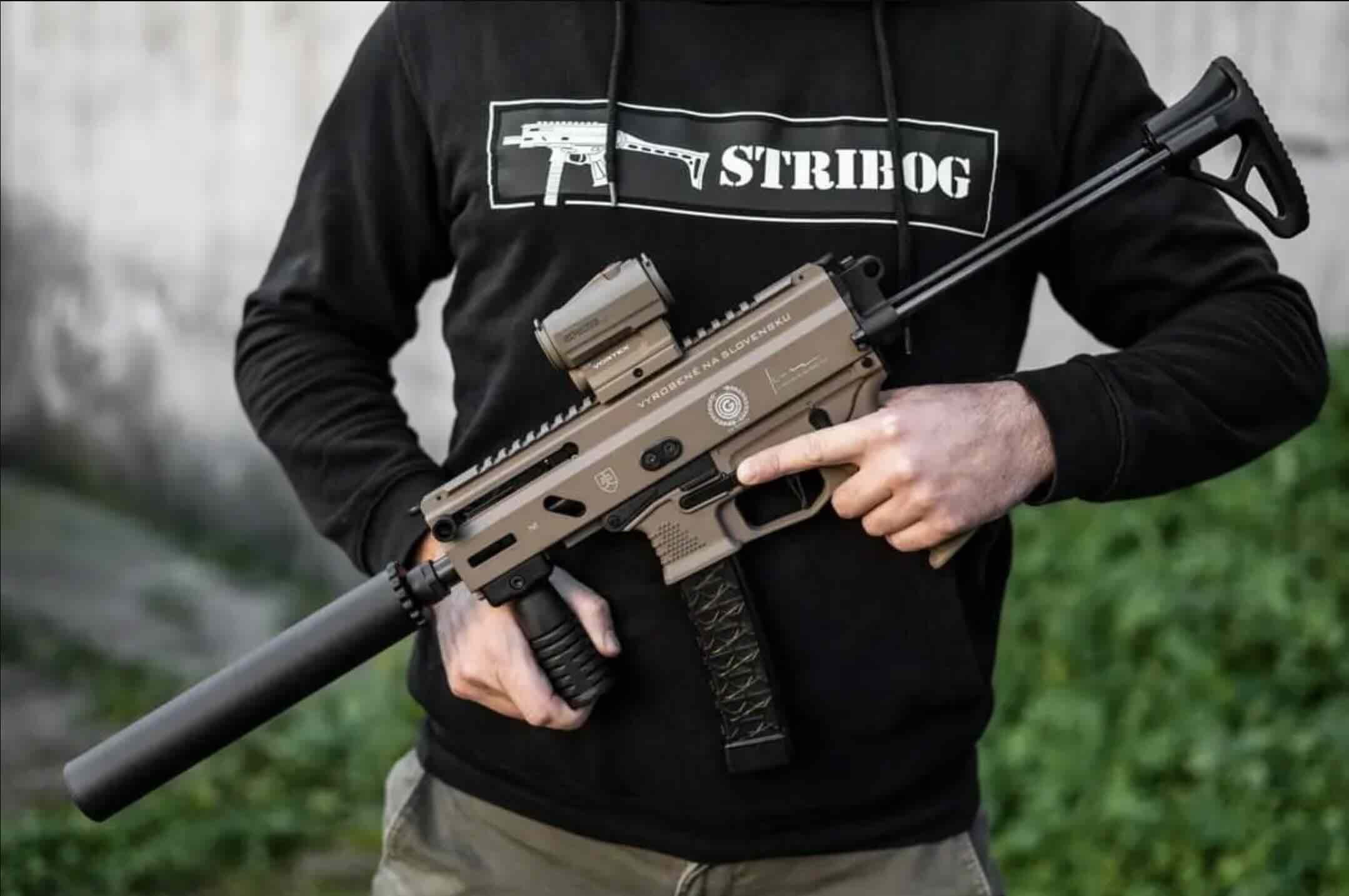
Submachine gun STRIBOG from GP. Source: sebronarms.sk
These claims were uncritically spread by disinformation websites such as Prehľad správ, the internet radio station Slobodný vysielač, the monthly magazine Extra plus, and even the son of former Prime Minister Ján Čarnogurský Jr.
This year, Kuracina is once again trying to influence public discourse about himself through disinformation outlets. In June 2025, the monthly magazine Extra Plus published an article titled “Jaroslav Kuracina has said goodbye to politics forever.”
“He is not one of those entrepreneurs who are primarily interested in profit; he treats the people in his company like his own children,” reads the laudatory article on the disinformation website.
Kuracina emphasizes his departure from politics in order to rid himself of the label of extremist. He does so even through websites that once courted Kotleba’s party and are now popular among more mainstream politicians in the ruling coalition, especially Smer, in which Defense Minister Robert Kaliňák has a significant say.
This investigation was originally published in Slovak on ICJK.sk.
Subscribe to Goulash, our original VSquare newsletter that delivers the best investigative journalism from Central Europe straight to your inbox!
Tomáš Madleňák is a Slovak journalist who has worked for the Investigative Center of Ján Kuciak since 2020. He is based in Bratislava.

